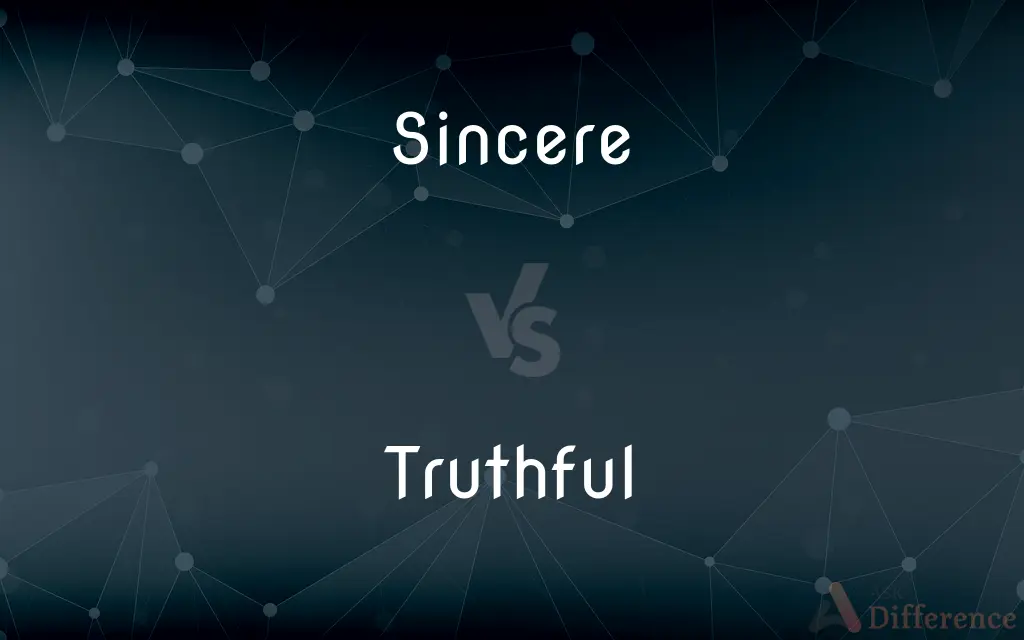Sincere vs. Truthful — What's the Difference?
By Tayyaba Rehman & Fiza Rafique — Updated on April 24, 2024
Sincere implies genuine feelings without pretense, while truthful specifically means adhering to facts without lying.

Difference Between Sincere and Truthful
Table of Contents
ADVERTISEMENT
Key Differences
Sincere behavior is characterized by authenticity and earnestness in one’s emotions or actions. On the other hand, being truthful focuses primarily on accuracy and honesty in one's statements.
A sincere person may express their feelings or thoughts with heartfelt genuineness, whereas a truthful person ensures their statements align with reality, regardless of their emotional state.
Sincerity often relates to intentions and attitudes, showing a person's true self without artifice, while truthfulness is about factual correctness in communication.
In relationships, sincerity might be shown through actions and behaviors that reflect one's true feelings, whereas truthfulness is demonstrated through transparent and accurate verbal communication.
While sincerity can sometimes be subjective, based on personal feelings or beliefs, truthfulness demands objective alignment with established facts and truths.
ADVERTISEMENT
Comparison Chart
Definition
Showing genuine feelings or beliefs without pretense
Adhering strictly to truth; accurate in statements
Focus
Emotions and intentions
Factual accuracy in communication
Communication Relevance
More about emotional truth and expression
Centrally involves factual and literal truth
Subjectivity
Often subjective; related to personal authenticity
Objective; tied to factual correctness
Relationship Implication
Important for emotional bonding and authenticity
Crucial for trust based on factual honesty
Compare with Definitions
Sincere
Free from pretense or deceit.
She gave a sincere compliment, truly admiring the skill displayed.
Truthful
Telling or inclined to tell the truth.
He was always truthful about his whereabouts.
Sincere
Truly meant or earnestly expressed.
She was sincere in her intentions to make amends.
Truthful
Corresponding to reality.
Her account of the incident was truthful and detailed.
Sincere
Showing true self without artifice.
His sincere demeanor made him very approachable.
Truthful
Accurate, without embellishment.
Her description of the event was straightforward and truthful.
Sincere
Demonstrating genuine emotion or belief.
His apology was sincere, reflecting true remorse.
Truthful
Honest in communication.
He was truthful in disclosing the challenges of the project.
Sincere
Heartfelt or earnest.
His sincere efforts to help were appreciated by everyone.
Truthful
Not lying or cheating.
The witness was truthful in her testimony.
Sincere
Not feigned or affected; genuine
Sincere indignation.
Truthful
Telling or expressing the truth; honest
I think you're confusing being rude with being truthful
I want a truthful answer
Sincere
Being without hypocrisy or pretense; true
A sincere friend.
Truthful
Consistently telling the truth; honest.
Sincere
Genuine; meaning what one says or does; heartfelt.
I believe he is sincere in his offer to help.
Truthful
Corresponding to reality; true.
Sincere
Meant truly or earnestly.
She gave it a sincere if misguided effort.
Truthful
Honest, and always telling the truth.
Someone's truthful nature
Sincere
(archaic) clean; pure
Truthful
Accurately depicting what is real.
He drew a truthful portrait of the prince.
Sincere
Whole; perfect; unhurt; uninjured.
The inviolable body stood sincere.
Truthful
Full of truth; veracious; reliable.
Sincere
Being in reality what it appears to be; having a character which corresponds with the appearance; not falsely assumed; genuine; true; real; as, a sincere desire for knowledge; a sincere contempt for meanness.
A sincere intention of pleasing God in all our actions.
Truthful
Expressing or given to expressing the truth;
A true statement
Gave truthful testimony
A truthful person
Sincere
Honest; free from hypocrisy or dissimulation; as, a sincere friend; a sincere person.
The more sincere you are, the better it will fare with you at the great day of account.
Truthful
Conforming to truth;
I wouldn't have told you this if it weren't so
A truthful statement
Sincere
Open and genuine; not deceitful;
He was a good man, decent and sincere
Felt sincere regret that they were leaving
Sincere friendship
Sincere
Characterized by a firm and humorless belief in the validity of your opinions;
Both sides were deeply in earnest, even passionate
An entirely sincere and cruel tyrant
A film with a solemn social message
Common Curiosities
What defines a sincere person?
A sincere person genuinely expresses their emotions or beliefs without any pretense.
Is sincerity the same as honesty?
Not exactly; sincerity involves genuineness in expression, while honesty focuses on truthfulness in facts.
What is the importance of being truthful?
It builds trust through accuracy and reliability in communication.
Can a sincere statement be misleading?
Yes, if it is based on incorrect assumptions or misinformation.
How can truthfulness prevent conflicts?
By removing misunderstandings and ensuring clear, accurate communication.
How does truthfulness impact professional settings?
It ensures transparency and fosters trust among colleagues and clients.
How can one be truthful?
By consistently making statements that align with the facts and reality.
What role does sincerity play in leadership?
It helps in building loyalty and trust among followers through genuine actions and intentions.
Can someone be sincere but not truthful?
Yes, if they genuinely believe in something that is factually incorrect.
Why is truthfulness valued in legal contexts?
Because it upholds the integrity of legal proceedings through factual accuracy.
Is it difficult to be both sincere and truthful?
It can be challenging when personal beliefs conflict with objective facts.
Does sincerity affect relationships?
Yes, it fosters deeper emotional connections through genuine expressions.
What are the consequences of lacking sincerity or truthfulness?
It can lead to distrust, misunderstandings, and weakened relationships.
How does culture influence perceptions of sincerity and truthfulness?
Cultural norms dictate how emotions and truths are expressed and valued.
How do children learn sincerity and truthfulness?
Through examples set by adults and through reinforcement of honest behavior.
Share Your Discovery

Previous Comparison
Ingress vs. Egress
Next Comparison
Occupied vs. PreoccupiedAuthor Spotlight
Written by
Tayyaba RehmanTayyaba Rehman is a distinguished writer, currently serving as a primary contributor to askdifference.com. As a researcher in semantics and etymology, Tayyaba's passion for the complexity of languages and their distinctions has found a perfect home on the platform. Tayyaba delves into the intricacies of language, distinguishing between commonly confused words and phrases, thereby providing clarity for readers worldwide.
Co-written by
Fiza RafiqueFiza Rafique is a skilled content writer at AskDifference.com, where she meticulously refines and enhances written pieces. Drawing from her vast editorial expertise, Fiza ensures clarity, accuracy, and precision in every article. Passionate about language, she continually seeks to elevate the quality of content for readers worldwide.
















































